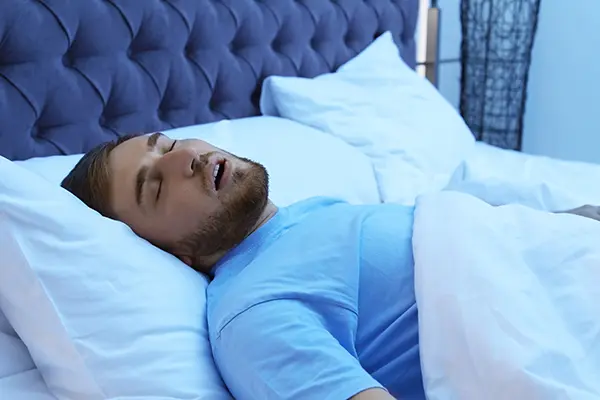Sleep Apnea
 Sleep apnea is a serious sleep disorder characterized by repeated interruptions in breathing during sleep. These interruptions can last for a few seconds to minutes and may occur dozens or even hundreds of times a night, leading to fragmented sleep and reduced oxygen supply to the body. Sleep apnea is a serious sleep disorder characterized by repeated interruptions in breathing during sleep. These interruptions can last for a few seconds to minutes and may occur dozens or even hundreds of times a night, leading to fragmented sleep and reduced oxygen supply to the body.
What Is Sleep Apnea?
Sleep apnea is primarily classified into three types: obstructive sleep apnea (OSA), central sleep apnea (CSA), and complex sleep apnea syndrome.
| • |
Obstructive Sleep Apnea is the most common type, occurring when the muscles in the throat relax excessively during sleep, causing a temporary blockage of the airway.
|
| • |
Central Sleep Apnea occurs when the brain fails to send proper signals to the muscles that control breathing.
|
| • |
Complex Sleep Apnea Syndrome is a combination of both OSA and CSA. |
Sleep apnea can lead to various health problems, including:
| • |
Daytime Fatigue: The constant interruptions in sleep can result in excessive daytime sleepiness, impacting daily activities and overall quality of life.
|
| • |
Cardiovascular Issues: Untreated sleep apnea increases the risk of high blood pressure, heart disease, and stroke.
|
| • |
Cognitive Impairment: It can affect memory, concentration, and mood, leading to increased anxiety and depression.
|
| • |
Metabolic Disorders: There's a connection between sleep apnea and metabolic conditions like diabetes. |
How Is Sleep Apnea Diagnosed?
The diagnosis of sleep apnea typically involves several steps:
| • |
Medical History and Symptoms Review: The healthcare provider will discuss your symptoms, medical history, and any lifestyle factors that might contribute to sleep apnea.
|
| • |
Sleep Study (Polysomnography): A sleep study is usually conducted to monitor various body functions during sleep, including breathing patterns, oxygen levels, heart rate, and brain activity. This is done in a sleep lab or at home using portable monitoring devices.
|
| • |
Physical Examination: A physical examination may include checking for factors that could contribute to sleep apnea, such as enlarged tonsils or excess weight. |
Treatment Options for Sleep Apnea
Treatment for sleep apnea varies based on its severity and type:
| • |
Lifestyle Changes: Mild cases are often managed with lifestyle modifications, such as losing weight, avoiding alcohol, quitting smoking, and changing sleep positions.
|
| • |
Continuous Positive Airway Pressure (CPAP) Therapy: CPAP is the most common treatment for moderate to severe OSA. It involves wearing a mask connected to a machine that delivers a continuous stream of air to keep the airway open during sleep.
|
| • |
Oral Appliances: Dental devices can reposition the jaw and tongue to help keep the airway open. These are often recommended for patients with mild to moderate OSA.
|
| • |
Surgery: In severe cases, surgical options are considered to remove excess tissue from the throat or correct structural issues contributing to airway obstruction. |
Recovery Period
Recovery from sleep apnea treatment depends on the chosen method:
| • |
CPAP Therapy: Patients typically start noticing improvements in sleep quality within a few days, though it may take time to adjust to using the machine. Regular follow-ups with a healthcare provider ensure optimal settings and comfort.
|
| • |
Oral Appliances: These are often effective almost immediately, but some patients may experience discomfort initially, which usually subsides over time.
|
| • |
Surgery: Recovery varies based on the procedure performed. Patients may need to follow specific aftercare instructions and will likely have follow-up appointments to monitor healing and effectiveness. |
How Long Does Treatment Last?
With effective treatment, many individuals experience significant improvements in their symptoms. CPAP therapy, for instance, requires ongoing use to maintain benefits. Lifestyle changes can lead to long-lasting results, but continued commitment is essential for sustained improvement. Regular follow-ups with healthcare providers help manage sleep apnea effectively over the long term.
Schedule Your Appointment today!
If you are interested in learning more about our services, please call (971) 374-5600, and schedule your appointment today!
|
 Sleep apnea is a serious sleep disorder characterized by repeated interruptions in breathing during sleep. These interruptions can last for a few seconds to minutes and may occur dozens or even hundreds of times a night, leading to fragmented sleep and reduced oxygen supply to the body.
Sleep apnea is a serious sleep disorder characterized by repeated interruptions in breathing during sleep. These interruptions can last for a few seconds to minutes and may occur dozens or even hundreds of times a night, leading to fragmented sleep and reduced oxygen supply to the body.